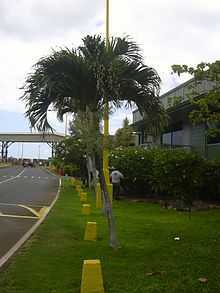Adonidia
| Adonidia | |
|---|---|
 | |
| Adonidia merrillii | |
| Scientific classification | |
| Kingdom: | Plantae |
| (unranked): | Angiosperms |
| (unranked): | Monocots |
| (unranked): | Commelinids |
| Order: | Arecales |
| Family: | Arecaceae |
| Genus: | Adonidia Becc.[1] |
Adonidia is a genus of flowering plants in the Arecaceae family.
At present (April 2014) there are two recognized species.[2] The first and better known is the Manila Palm (Adonidia merrillii). It is native to Palawan, Danjugan Island and Sabah, and reportedly naturalized in the West Indies.[2] It is commonly known as the "Christmas Palm" because its fruits become bright scarlet and tend to be that color in winter. This palm is typically fairly small and slender, normally attaining 15–25 feet in height but has attained 36 feet grown in greenhouse conditions.
The second species is Adonidia maturbongsii, native to New Guinea, first described in 2012.[3]
Some palms sold in retail outlets as "adonidia" are in fact Alexander palms, which are similar but even thinner.
Uses
Adonidia merrillii is widely planted in cultivation and grows well in tropical locations such as Hawaii and the southern half of the Florida peninsula. Its fruits are sometimes said to be used as a substitute for the betel nut, in preparing buyo (fruit of Areca catechu, leaves of Piper betle, and lime) for chewing. [4]
-

Veitchia merrillii – fruits
-

Veitchia merrellii – fruits
-

Veitchia merrellii – seeds
-

Veitchia merellii – trunk
-
Fruits of a Dwarf Royal Palm or Christmas Palm (Veitchia merrillii) photographed in Ghana
-

Palm and fruits. Cultivar, Bahia, Brazil
References
- ↑ Beccari, Philippine Journal of Science 14:329. 1919 Type:A. merrillii
- ↑ 2.0 2.1 Kew World Checklist of Selected Plant Families, Adonidia
- ↑ W.J.Baker & Heatubun, Palms (1999+) 56: 134 (2012).
- ↑ William H. Brown, Ph.D.; Elmer D. Merrill, M. S. Philippine Palms and Palm Products. Department of Agriculture and Natural Resources. Bureau of Forestry . Bulletin No. 18. Bureau Of Printing Manila, 1919 - p.15-16 https://archive.org/details/acx4921.0001.018.umich.edu Jan. 2014
External links
- Johnson, D. 1998. Adonidia merrillii. 2006 IUCN Red List of Threatened Species. Downloaded on 20 July 2007.
- Adonidia merrillii in: Philippine Medicinal Plants.Stuartx Change Jan. 2014
| Wikimedia Commons has media related to Adonidia merrillii. |